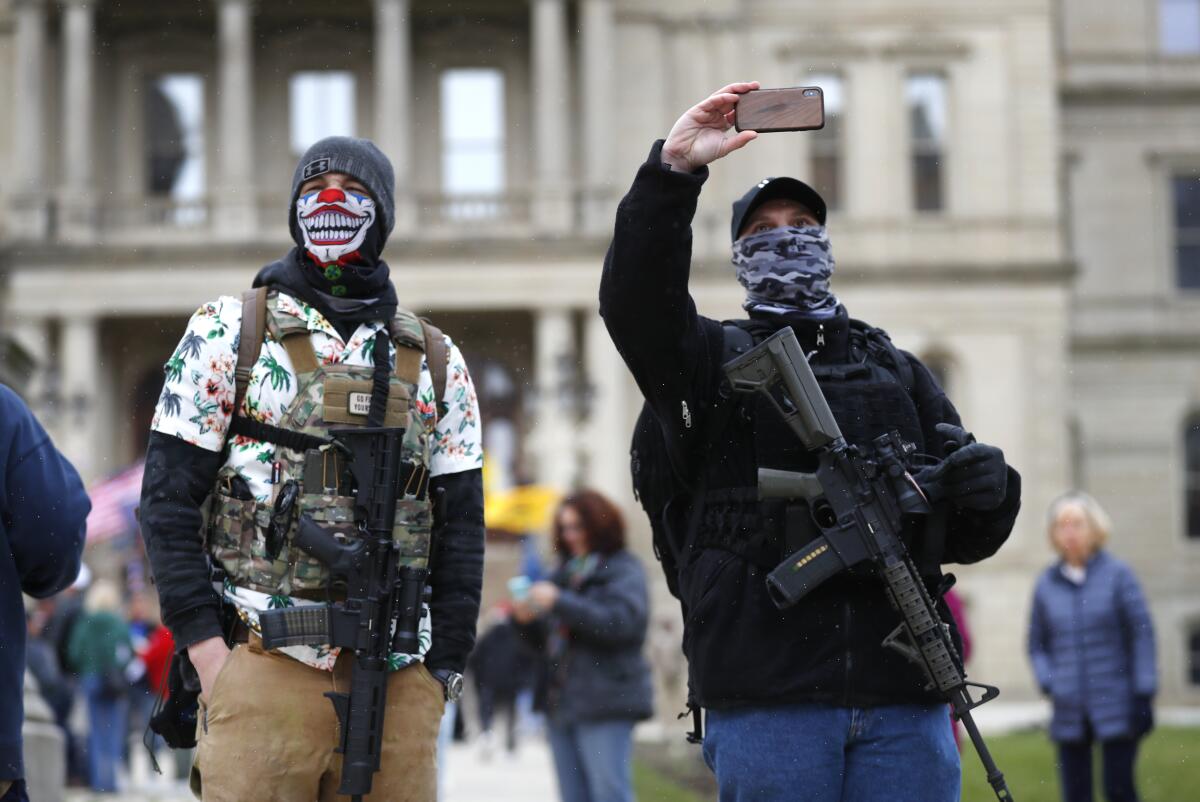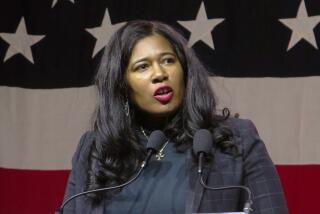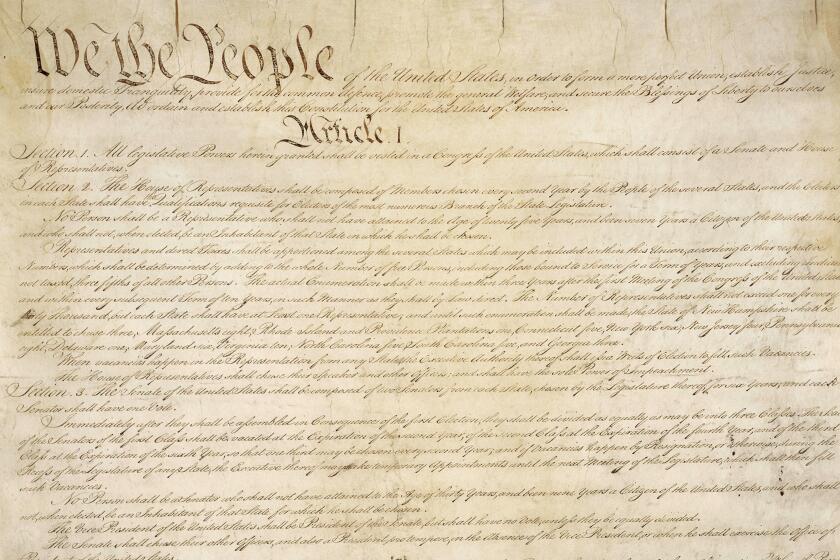Column: Gun-toting Republicans ignoring quarantine orders? Yes, even coronavirus has become part of the culture wars

It was 35 degrees and lightly snowing in Lansing the other day when cars and trucks filled the streets, stretching as far as the eye could see. This was “Operation Gridlock,” and the idea was to shut the city down with cars, trucks and rage.
Thousands of Michiganders had come to protest Gov. Gretchen Whitmer’s stay-at-home order, one of the most extreme in the nation, aimed at slowing down the inexorable march of the coronavirus. Detroit, with a majority black population and a poverty rate nearly three times the national average, has been hit especially hard by the virus.
By executive order, only essential Michigan businesses can remain open. At least 1 million people, a quarter of the state’s workforce, have applied for unemployment.
Until May 1, and maybe beyond, Michigan residents cannot cross the street to visit friends, mow their lawns or take their boats out. They can’t fish, golf or travel between their primary residence and vacation home.
Protesters were supposed to stay in their vehicles, to respect the social distancing rules most of us are trying to follow. And most did. But dozens were on the Capitol’s steps, mingling on the grounds, thrusting a metaphorical middle finger at the new world order.
I watched a livestream of the protest on the website of the Detroit Free Press. Protesters waved American flags, “Don’t Tread on Me” flags, handmade protest signs demanding the governor be recalled and dozens of “Trump 2020” banners. Some concerned citizens, the Lansing Journal reported, brought their assault rifles and Confederate flags.
“We believe the government has overreached,” a masked man told a local TV reporter. “The virus is not as serious as they made it out to be.”
For a moment, I was catapulted back to 2009, when righteous citizens pretended to be terribly upset about the federal budget deficit (and of course their protests had nothing to do with the fact that the country had its first black president). The tea party fizzled, but its free-floating rage remained, only to be harnessed in 2016 by Donald Trump. His authoritarian tendencies would seem to be at odds with the freedom-loving patriots who support him, but that’s a question for another day.
The anger on display Monday in Michigan was yet another expression of our ongoing national political divide. It also raised a question: Are Republicans less likely to embrace social distancing and shutdown measures than Democrats?
The answer, according to a group of economists who have studied the question, is yes.
We appear to be in the midst of a coronavirus culture war.
::
In a new working paper released by the National Bureau of Economic Research, economists from Stanford, Harvard and New York University looked at whether partisan leanings influence beliefs about coronavirus. They were motivated to look into the issue by polls and surveys suggesting that residents of red states and blue states were responding differently to the coronavirus threat.
Study co-author Matthew Gentzkow, a senior fellow at Stanford’s Institute for Economic Policy Research, said he initially thought the differences could simply be attributed to the fact that Democrats tend to live in big cities, where the virus has flourished, while Republicans are more likely to live in places where the population is more spread out.
But the differences held even when comparing red and blue areas with similar kinds of communities with similar disease outbreaks. Using GPS location data from a large sample of smartphones, combined with a survey that examined political attitudes, Gentzkow and his colleagues found that Democrats and Republicans “genuinely differ in their beliefs about the severity of the outbreak.”
In other words, it’s not simply posturing or “partisan cheerleading” that has led Republicans to worry less about the virus, and Democrats to worry more.
“It’s not like we know what the right answer is,” Gentzkow told me. “We can’t say who is right and who is wrong. It’s precisely the fact that there is a huge amount of uncertainty that makes this difficult.”
Gentzkow, who has studied political polarization the United States, said he was surprised by what the study revealed. He thought there might have been partisan differences early on in the crisis, when President Trump was downplaying the risks of the coronavirus, saying it was no worse than the flu, and Democrats were citing models showing that 80% of the American population were going to contract the contagion.
He assumed that, as time went on, the partisan gaps would disappear, that his working paper would turn out to have simply been a snapshot of a polarized moment that faded as the country pulled together. That does not appear to be the case.
“These partisan differences,” he said, “do not seem to be going away.”
::
For the foreseeable future, Americans will wrestle with tradeoffs between public health and economic well-being. The president, who recently asserted his omnipotence, has blinked. Now he says governors will make the calls. This allows Trump to avoid making tough calls while attacking states whose Democratic governors have strict stay-at-home rules.
“LIBERATE MICHIGAN!” he tweeted on Friday. “LIBERATE MINNESOTA!” And “LIBERATE VIRGINIA, and save your great 2nd Amendment. It is under siege!” (Last week, Virginia Gov. Ralph Northam signed into law a slate of gun control measures.)
It’s easy to dismiss the Lansing protesters as fringe conservatives, with their guns, their Gadsden flags and their willingness to flout social distancing rules to make their points. But the thousands of folks who respected the rules and stayed in their vehicles cannot be discounted. Their pain is real.
Those of us whose salaries continue to appear in our checking accounts because we can work from home cannot be cavalier about the economic trauma this virus has inflicted on so many of our fellow citizens.
In the next couple of weeks, and perhaps until summer, we will see more protests, more polarization and more division as states wrestle with balancing safety and solvency.
And we will also see more infections, more illness and more death.
Coronavirus, after all, doesn’t care about partisan politics.
More to Read
A cure for the common opinion
Get thought-provoking perspectives with our weekly newsletter.
You may occasionally receive promotional content from the Los Angeles Times.







